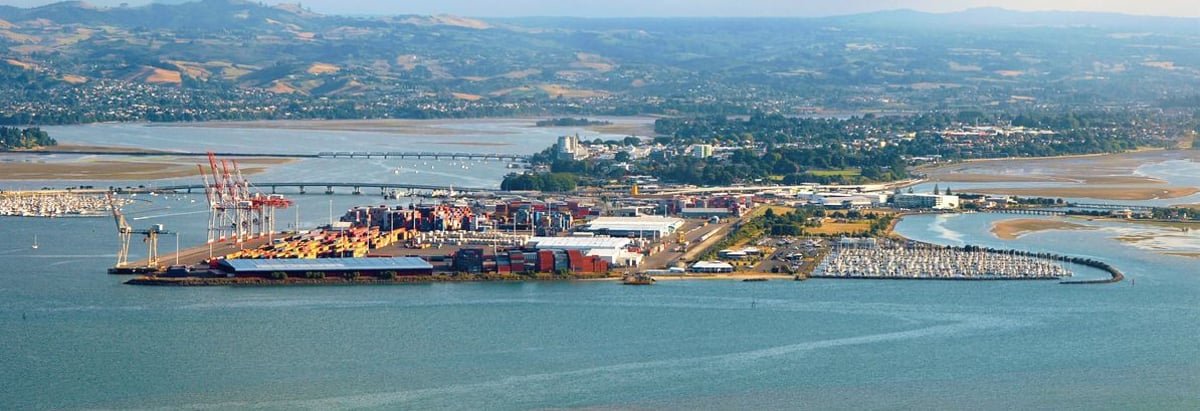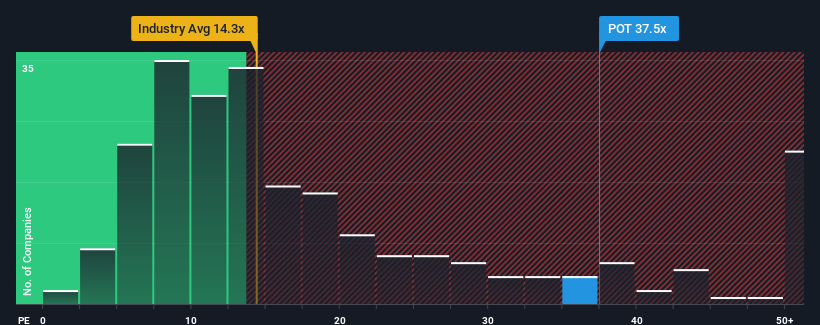- New Zealand
- /
- Infrastructure
- /
- NZSE:POT
Port of Tauranga Limited (NZSE:POT) Investors Are Less Pessimistic Than Expected

Port of Tauranga Limited's (NZSE:POT) price-to-earnings (or "P/E") ratio of 37.5x might make it look like a strong sell right now compared to the market in New Zealand, where around half of the companies have P/E ratios below 16x and even P/E's below 10x are quite common. Although, it's not wise to just take the P/E at face value as there may be an explanation why it's so lofty.
Port of Tauranga's negative earnings growth of late has neither been better nor worse than most other companies. It might be that many expect the company's earnings to strengthen positively despite the tough market conditions, which has kept the P/E from falling. You'd really hope so, otherwise you're paying a pretty hefty price for no particular reason.
See our latest analysis for Port of Tauranga

Is There Enough Growth For Port of Tauranga?
There's an inherent assumption that a company should far outperform the market for P/E ratios like Port of Tauranga's to be considered reasonable.
If we review the last year of earnings, dishearteningly the company's profits fell to the tune of 13%. This has soured the latest three-year period, which nevertheless managed to deliver a decent 12% overall rise in EPS. Accordingly, while they would have preferred to keep the run going, shareholders would be roughly satisfied with the medium-term rates of earnings growth.
Looking ahead now, EPS is anticipated to climb by 11% per year during the coming three years according to the five analysts following the company. With the market predicted to deliver 19% growth per year, the company is positioned for a weaker earnings result.
With this information, we find it concerning that Port of Tauranga is trading at a P/E higher than the market. Apparently many investors in the company are way more bullish than analysts indicate and aren't willing to let go of their stock at any price. There's a good chance these shareholders are setting themselves up for future disappointment if the P/E falls to levels more in line with the growth outlook.
The Final Word
Using the price-to-earnings ratio alone to determine if you should sell your stock isn't sensible, however it can be a practical guide to the company's future prospects.
We've established that Port of Tauranga currently trades on a much higher than expected P/E since its forecast growth is lower than the wider market. When we see a weak earnings outlook with slower than market growth, we suspect the share price is at risk of declining, sending the high P/E lower. Unless these conditions improve markedly, it's very challenging to accept these prices as being reasonable.
The company's balance sheet is another key area for risk analysis. Our free balance sheet analysis for Port of Tauranga with six simple checks will allow you to discover any risks that could be an issue.
Of course, you might find a fantastic investment by looking at a few good candidates. So take a peek at this free list of companies with a strong growth track record, trading on a low P/E.
New: Manage All Your Stock Portfolios in One Place
We've created the ultimate portfolio companion for stock investors, and it's free.
• Connect an unlimited number of Portfolios and see your total in one currency
• Be alerted to new Warning Signs or Risks via email or mobile
• Track the Fair Value of your stocks
Have feedback on this article? Concerned about the content? Get in touch with us directly. Alternatively, email editorial-team (at) simplywallst.com.
This article by Simply Wall St is general in nature. We provide commentary based on historical data and analyst forecasts only using an unbiased methodology and our articles are not intended to be financial advice. It does not constitute a recommendation to buy or sell any stock, and does not take account of your objectives, or your financial situation. We aim to bring you long-term focused analysis driven by fundamental data. Note that our analysis may not factor in the latest price-sensitive company announcements or qualitative material. Simply Wall St has no position in any stocks mentioned.
Have feedback on this article? Concerned about the content? Get in touch with us directly. Alternatively, email editorial-team@simplywallst.com
About NZSE:POT
Port of Tauranga
A port company, provides and manages port services and cargo handling facilities through the Port of Tauranga, MetroPort, and Timaru Container Terminal in New Zealand.
Proven track record with adequate balance sheet.


